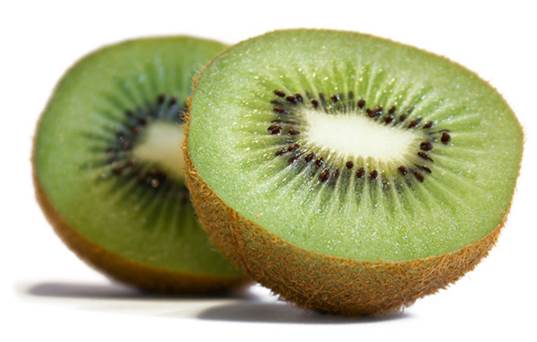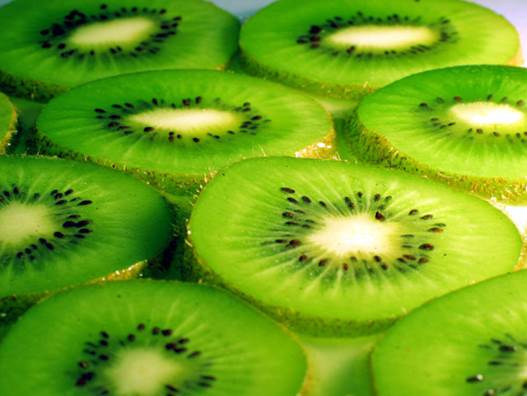The furry fruit is famous for nutritional
health effects.
Improving health
Kiwi is known as a super fruit. A kiwi can
provide you with vitamins, minerals, calories in over the 27 most popular
fruits. Therefore, it comes first among fruits that have high content of
nutrients.

Kiwi
is known as a super fruit.
Antioxidant effects
Kiwi is a wonderful source of fiber,
potassium, acid folic, vitamin C and E, carotenoid, antioxidants and minerals.
Those are necessary nutrients for having good health and body flexibility.
Having a low GI index
Kiwi has a low GI index (its glycemic index
is 48.5), which helps stabilize the level of sugar in blood. The foods that
have low GI indexes can decrease the risk of heart diseases, diabetes and
control the weight of the body.
Providing folate for pregnant women

Kiwis
will bring pregnant women a source of folate.
Pregnant women need about 400-800mg folate
to provide for fetal healthy development in the first stage of pregnancy. Kiwis
will bring them a source of folate. Folate is very important to brain
development, cognizance and prevent fetuses from defects (before and during
pregnancy). Folate produces and repairs DNA as well as supports cell divisions
and children’s growths.
Providing fibers
A kiwi contains 2.3g fiber. Soluble fibers
can support digestion, improve constipation and heaviness.
The fibers in kiwi are good conditions for
good bacteria to live in the digestive system. It can connect to harmful
substances in digestive system and discharge toxic products. The large content
of fiber in kiwi can also help maintain the weight.
Treating osteoporosis for old-aged people
A half of a kiwi has the same amount of
potassium in a banana but have less amount of calories than the banana’s. Kiwi
is an ideal fruit for the older that tend to have osteoporosis by potassium
deficiency.
Potassium is very important to heart
functions, bones and muscles.
Building muscles and nerves

In
a kiwi, there’s over 20mg magnesium.
Magnesium is one of necessary for over 300
biochemical reactions in the body. In a kiwi, there’s over 20mg magnesium.
Magnesium can maintain the functions of muscles and nerves, stabilize the
heartbeat, support immunity and improve bone health.
It also adjusts the level of sugar in
blood, keeping the blood pressure at its normal state. Magnesium also takes
part in energy metabolism and protein synthesis processes.
Delaying aging
Eating kiwi is a natural way to get
polyphenol and carotenoid antioxidants and phytochemical which help decrease
cell injuries.
The antioxidants that kiwis providing will
help you prevent DNA and tissue damages caused by free radicals and
antioxidants. Antioxidants can also help delay aging. Vitamin E in kiwis is
also necessary to the developments of healthy red blood cells.
Keeping the level of cholesterol under control

Eating
2-3 kiwis a day is proved to be able to decrease platelet aggregation.
Researches proved that the total of
antioxidant’s activities in 50mg/ml and kiwis were 96-98%, making the kiwi the
ideal fruit for protecting heart. Eating 2-3 kiwis a day is proved to be able
to decrease platelet aggregation. Platelet aggregation is one of elements
causing cardiovascular diseases.
Decreasing the chance of amblyopia
The kiwi is one of best fruits containing
lutein. Lutein is one of antioxidants which help prevent amblyopia relating to
ages and able to cause blindness.
The content of vitamin E in kiwis can help
improve macular degeneration relating to age.